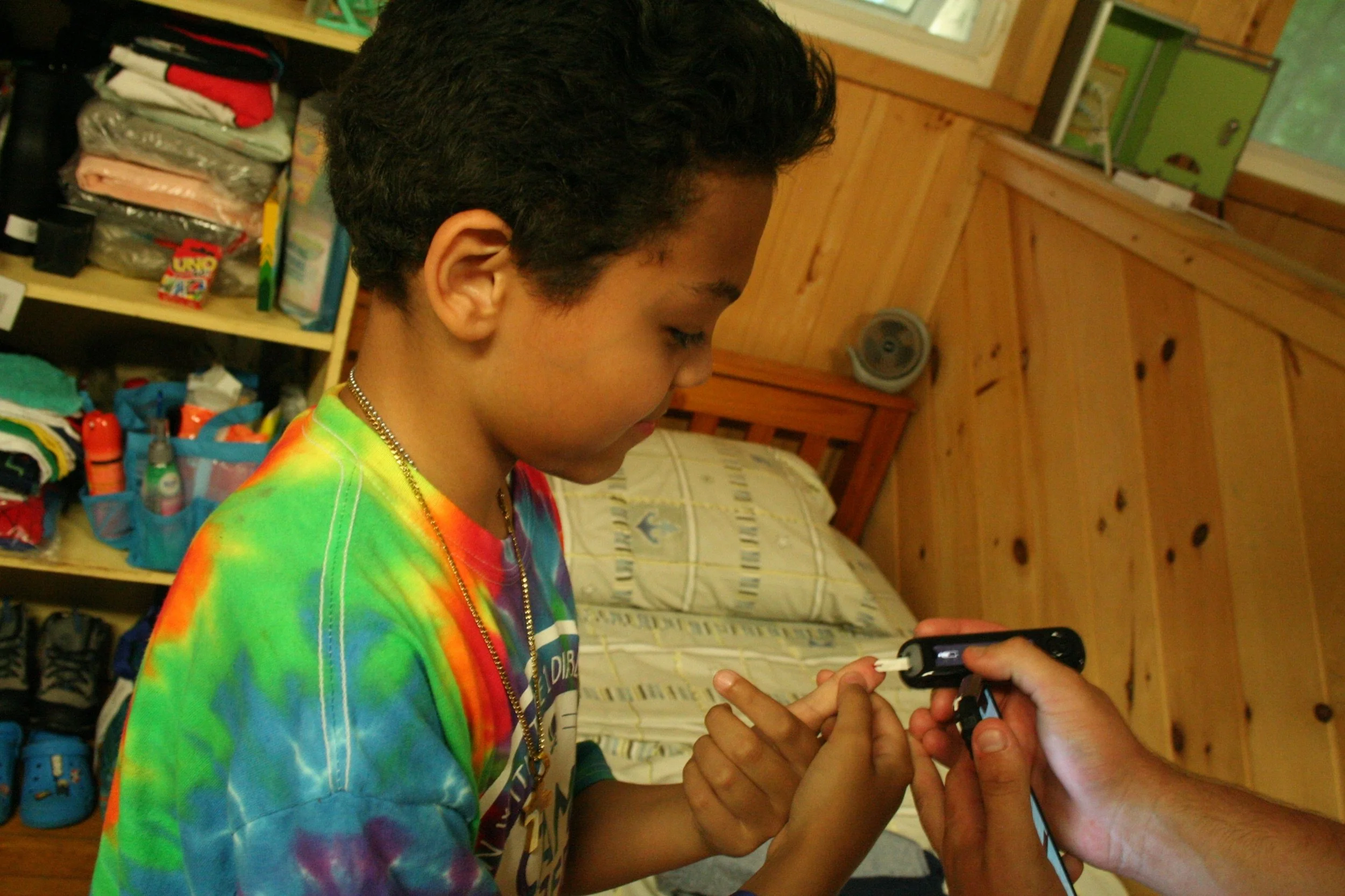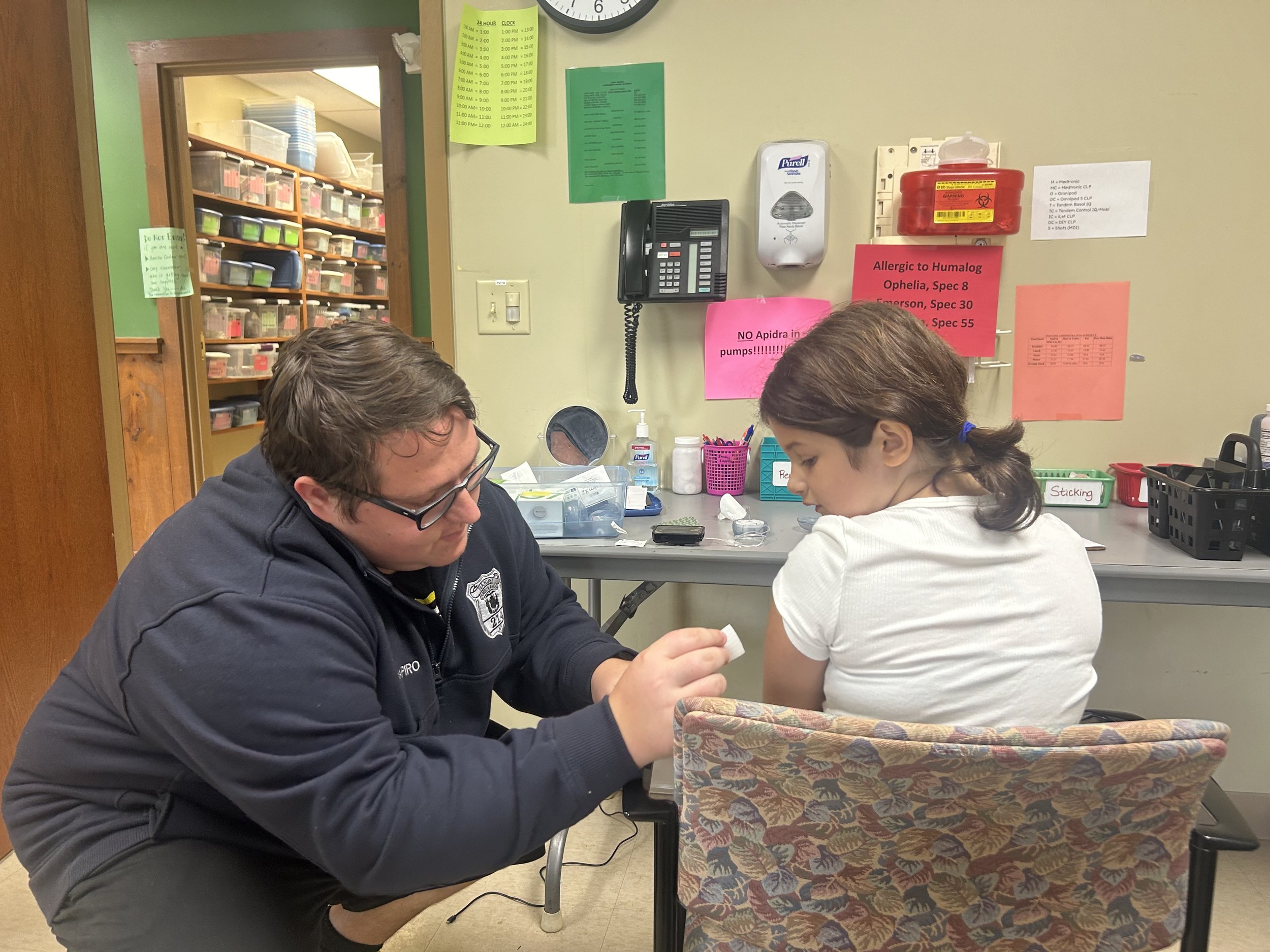Our Approach to Diabetes Education
Unlike the intimidating clinical settings as hospitals and doctors' offices, Camp Nejeda's unique environment encourages hands-on learning so that kids can practice new skills and learn how diabetes works in their own bodies. Alongside other children with diabetes and specially trained counselors, our campers spend each day safely learning through experience.
Camper Safety with T1D
-
Scenario: A camper, Julie, along with the rest of her cabin mates and counselors, are asleep at 2am when her CGM starts alerting.
1. In the Health Center, the Night Nurse, Emily, gets the alert that Julie’s blood sugar is reading 68 mg/dl. She informs the Night Assistant, Sophia, who gets on the golf cart and drives to the cabin.
2. When Sophia gets to the cabin, she uses the cabin chart and name tags above the beds to confirm which bed Julie is in.
3. Since Julie is on a closed loop system, Sophia gives her 2 ounces of juice, then records the number and treatment in the spec sheet.
4. After waiting 15 minutes, Sophia re-check’s Julie with a finger-stick.
5. The meter now reads 98 mg/dl. Sophia gives Julie 2 ounces of chocolate milk to keep her blood sugar stable.
6. After Julie finishes the chocolate milk, Sophia then updates the spec sheet and returns back to the Health Center.
Camp Nejeda serves flavorful meals of freshly prepared food. During their stay, campers learn how to count carbs and are guided through the process of making food choice decisions just as they do at home.
Carb counts of mealtime options are distributed to counselors ahead of the meal so campers may estimate what and how much they will eat and therefore, need to bolus for. The counts are also displayed throughout the meal so campers may adjust their decisions and receive coverage for extra carbs. Please see the example below:
The Health Center
We ensure that our campers are safe throughout the day by maintaining small camper to staff ratios, utilizing proactive treatment protocols developed by diabetes experts, smart tracking of blood glucose readings, and providing 24/7 access to a one-of-a-kind health center staffed by licensed nurses and physicians. Campers are never without a buddy or group in case of emergency.
Cabin counselors receive several days of diabetes management and emergency procedure training ahead of camper arrival that covers everything from carb counting to administering Insta-glucose. Counselors carry backpacks filled with diabetes supplies everywhere they go. A majority of our summer staff have type 1 diabetes themselves or have already been introduced to the world of T1D by a person close to them.
-
Scenario: A group of campers are playing basketball when Eric starts to look fatigued and sits down.
1. Eric is approached by his counselor, John, who urges him to check his blood sugar. His CGM reads 102 mg/dl, but John suspects it's much lower based on Eric's symptoms.
2. John sits with Eric and helps him use a meter and test strip. The meter reads 68 mg/dl.
3. Since Eric is on a closed-loop pump, John gives him 2 glucose tabs and records the number in the online "spec" sheet that is monitored by the health center.
4. John sits with Eric for 15 minutes before re-checking with another finger stick.
5. The meter reads 100 mg/dl. John gives Eric an 8 carb snack to keep his blood sugar stable.
6. John updates the spec sheet and sends Eric back to play.
Our Health Center is staffed by licensed nurses and physicians, 24 hours a day. The complete medical team is comprised of registered nurses, a volunteer pediatric endocrinologist, a family medicine resident, a dietician, technology facilitators, and nursing student/Health Center assistants.
Hunterdon Medical Center: Family Medicine Residency Program
For over 50 years, family medicine residents from Hunterdon Medical Center have spent part of their third and final year at Camp Nejeda. While gaining valuable insights into practical diabetes management, these doctors are able to handle any aches and pains that might arise during the summer. We are proud to continue this historic relationship, which has enhanced not only the medical care at Camp Nejeda, but also the understanding of what it's like to live with type 1 diabetes for every graduate of the Hunterdon Medical Center's Family Medicine Residency program.
Emergency Services:
Newton Medical Center, 7 miles from camp
Atlantic Urgent Care at Newton, 13 miles from camp
Health & Wellness
The Dining Hall
The camp’s dietitian assists with meal planning and provides nutrition education for campers. Our dietitian also works with the camp’s chef to meet campers' individual dietary restrictions such as those related to celiac disease and food allergies. We are a peanut-free facility.





